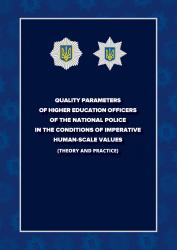Innovation of markers for assessment of the quality of educational and scientific research activities of students in higher education institutions with special earning conditions
Keywords:
communicative competence, National Police of Ukraine, human rights and freedoms, ethical principles, interaction, personnel policy, convention, rules (codes) of ethical behavior, psychological contact, reform, humanity, police deontology, leader, law enforcement system, courage, police ethics, leadership, law enforcement agencies, honesty, corruption, self-organization, law and order, responsibility, child protection, self-development, professional identity, justice, minor, narrative professional ethics, legal and psychological foundations official activities, respect, traumatic events events, trust, professional activity, moral behavior, stress, police, service training, legal basis of professional ethics, child-friendly room, National Police of Ukraine, professional training of a police officer, ethical principles, psychological safety g compliance, personnel policy, professional selection, rules (codes) of ethical behavior, resilience, reform, training of police officers, police deontology, psychological resources, law enforcement system, professionalization of law enforcement officers, police ethics, education, law enforcement agencies, personality of a police officer, corruption, EU educational policy, law and order, value experience, child protection, education applicant, professional identity, competence, minor, transformational learning, legal and psychological foundations official activities, communicative competence, traumatic events events, forms and methods of education, professional activity, interaction, stress, education quality, service training, psychological contact, child-friendly room, assessment, professional training of a police officer, leader, psychological safety g compliance, police performance assessment, professional selection, leadership, resilience, departmental assessment, training of police officers, self-organization, psychological resources, assessment procedure, professionalization of law enforcement officers, self-development, education, work program of the academic discipline, personality of a police officer, narrative professional ethics, EU educational policy, assessment methods, value experience, moral behavior, education applicant, criterion analysis, competence, legal basis of professional ethics, transformational learning, assessment criteria, forms and methods of education, learning outcomes, education quality, behavioral diagnostics, assessment, workshop, police performance assessment, psychological training, departmental assessment, psycho-pedagogical support, assessment procedure, pedagogical skills, work program of the academic discipline, pedagogical skills of a higher school teacher, assessment methods, advanced training of scientific and pedagogical personnel, criterion analysis, assessment criteria, learning outcomes, behavioral diagnostics, workshop, psychological training, psycho-pedagogical support, pedagogical skills, pedagogical skills of a higher school teacher, advanced training of scientific and pedagogical personnelAbstract
Chapter 11 specifies the essence and features of innovative markers for assessing the quality of educational and research activities of applicants in higher education institutions with special study conditions. Modern approaches to the development of effective educational materials with a rethinking of their psychological-pedagogical, didactic functions, content, forms and stages of creating effective modern educational content in the aspect of evaluating the quality of the educational process from the points of view of: "acquirer", "mentor", "quality expert" are defined – a specialist in the field of educational measurements, quality monitoring". on the example of the educational component "Methodology of scientific knowledge" for the third level of education, it is proved that the evaluation of the effectiveness of the educational process based on learning outcomes is a complex procedure within which the mentor must be clearly aware of the connection between the predicted learning outcomes and the methods of setting goals for their achievement even at the time of development course Thus, the technological cycle from the conception, development, implementation and evaluation of the educational component is closed, noting that the integrated goals of the educational component – the course, which must be clearly formulated by the teacher-mentor, combine 3 approaches (content, internal and external processes of learning – learning, outcome) it is they who become the basis of the didactic complex of the course markers for evaluating the quality of educational and research activities of applicants in higher education institutions with special conditions of study.

QUALITY PARAMETERS OF HIGHER EDUCATION OFFICERS OF THE NATIONAL POLICE IN THE CONDITIONS OF IMPERATIVE HUMAN-SCALE VALUES
Downloads
Pages
Published
Categories
License

This work is licensed under a Creative Commons Attribution-NonCommercial-NoDerivatives 4.0 International License.

